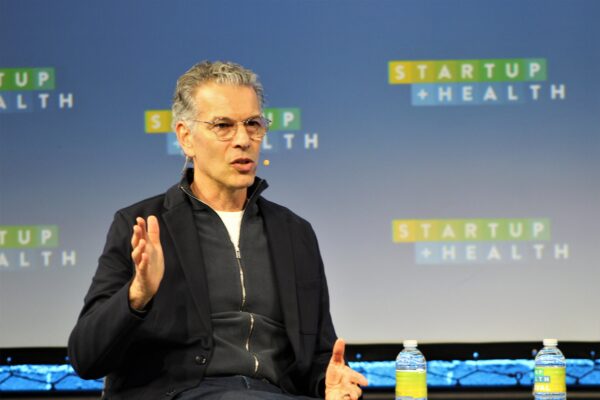
Google Health Vice President Dr. David Feinberg addresses privacy concerns about the company’s partnership with Ascension at the StartUp Health Conference.
Just a year into his new role, Google Health Vice President Dr. David Feinberg has a lot on his plate. The former Geisinger Health CEO must manage the tech giant’s multitude of health projects, from imaging work using Google’s DeepMind AI, to prioritizing accurate medical information over quackery in search results, to providing cloud hosting services for healthcare companies.
But straddling the two worlds of technology and healthcare, Feinberg boiled down Google Health’s biggest challenge to one word: Trust.
“The technology is amazing, but if you don’t trust us… If we can’t make it the way that I would care for my own family, I don’t care how good the AI is, it’s not going to work,” he said at the StartUp Health Festival on Tuesday.
Feinberg would have probably liked to talk more about Google’s high-profile successes in healthcare: using AI to interpret mammograms or predict kidney disease. Instead, he spent a large portion of his time on stage defending the company’s “Project Nightingale,” its controversial partnership with large nonprofit health system Ascension Health.
The Wall Street Journal first broke news of the project in November, highlighting an undisclosed agreement for Google to host Ascension Health’s records using Google’s cloud services, similar to work done by Amazon Web Services and Microsoft. The more interesting part of the deal was Google’s work to develop a search tool for health records.
The Journal reported that at least 150 Google employees had access to patient data, without notifying either patients or doctors. Shortly after the news broke, senators pushed for a federal inquiry into the project.

A Deep-dive Into Specialty Pharma
A specialty drug is a class of prescription medications used to treat complex, chronic or rare medical conditions. Although this classification was originally intended to define the treatment of rare, also termed “orphan” diseases, affecting fewer than 200,000 people in the US, more recently, specialty drugs have emerged as the cornerstone of treatment for chronic and complex diseases such as cancer, autoimmune conditions, diabetes, hepatitis C, and HIV/AIDS.
Feinberg assured listeners that Google doesn’t have access to all of Ascension’s health data; the tech giant is working with just two of its hospitals on the search engine project. He also made a point of noting that the agreement is compliant with the Health Insurance Portability and Accountability Act (HIPAA), and is separate from Google’s search advertising business.
“The work we did with Ascension, despite what they say in the newspapers, we’re super proud of,” he said. “This is not us mining somebody’s records to sell ads, to learn from it to do machine learning, to develop products.”
Feinberg said that tool works similarly to the search engine that most people use on a regular basis. But instead of pulling up webpage results, health professionals would be able to search through a patient’s health record. For example, he said, physicians could search for an MRI, find a record for a vaccine — even if it had been misspelled — or autocomplete searches within a patient’s record.
“As a practicing clinician, you go into these health systems, it’s like a needle in a haystack to find a piece of information,” he said. “You really have a view just for Epic or Cerner.”
For Google’s cloud services, Feinberg explained, the company doesn’t have access to patient records.
“We’re not looking at anything and we don’t need to and we’re happy to be in the cloud business,” he said.
For its research work in artificial intelligence , such as DeepMind’s recent efforts in mammography and diabetic retinopathy, the company gets deidentified data through partnerships with academic organizations.
When it comes to the search project, it’s a little bit different.
In developing the search tool, Feinberg admitted that some Google employees did have access to patient information. But because it was structured through a business associates agreement, it was HIPAA compliant. These agreements allow outside companies that work with providers to share data, such as EHR companies, insurance companies or diagnostics labs.
Ascension has 600 such agreements, Feinberg said. The St. Louis-based nonprofit health system is one of the largest in the country, spanning 150 hospitals.
Ascension also went to bat for the project this week. In a statement released on Saturday, Chief Strategy and Innovations Officer Eduardo Conrado wrote that the project was solely intended to improve the quality of care, dismissing concerns that the health system sought to use it as a tool to improve its top line.
“While the data will be examined to identify trends that enable us to improve patient care, increasing patient billings was never and will not be one of our objectives,” he wrote.
Even if the project is well-intentioned, it still raises important questions about patient privacy. For tech companies looking to enter the industry, where is the line drawn between their commercial efforts and healthcare efforts? Should patients have more say in how their records are used?
“We do appreciate that we’re in a somewhat unique position in that we’re also a consumer company and there’s worry that we’re combining stuff,” Feinberg said. “We’re not combining stuff. But to build that trust, I think we really have to think about ways to give people agency to understand what’s going on. (Such as) in this particular instance, where we may be exposed to some private health information.”
Photo credit: Elise Reuter












